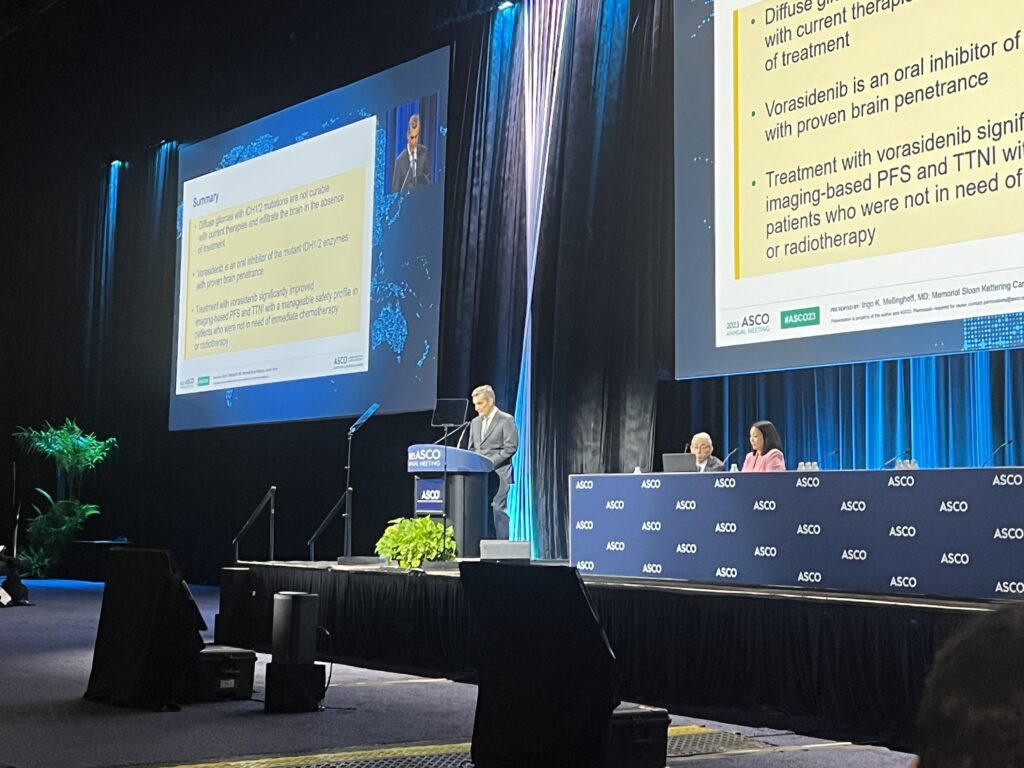UPDATED (August 6, 2024): The U.S. Food and Drug Administration (FDA) has approved vorasidenib (brand name: Voranigo) for the treatment of adult and pediatric patients 12 years of age and older with grade 2 astrocytoma or oligodendroglioma with an IDH1 or IDH2 mutation, following surgery including biopsy, sub-total resection, or gross total resection. This is the first FDA approval of a systemic therapy for patients with Grade 2 astrocytoma or oligodendroglioma with a IDH1 or IDH2 mutation. Read the full press release from the FDA, here. And you can read how NBTS — thanks to our supporters — played a role in advancing this new treatment in our 2023 Annual Report (page 4).
[ORIGINAL POST: June 3, 2023] Today, at the American Society for Clinical Oncology Annual Meeting positive results were presented from a large, international phase III clinical trial (INDIGO trial) of patients older than 12 with grade 2 IDH-mutated diffuse glioma. The results were also published simultaneously in the New England Journal of Medicine.
The trial evaluated whether a drug called vorasidenib could increase “progression-free survival” (also called “PFS,” and meaning the length of time a patient lives before their tumor worsens or resumes growing) and delay the length of time before patients needed radiation and chemotherapy (called time to next intervention, or “TTNI.”) Results showed that patients who received vorasidenib had clear benefits in both of these measures as compared to patients who were in a control group.
Median PFS for patients receiving vorasidenib more than doubled, going from approximately 11 months for patients in the control groups, to 28 months for patients taking the treatment, thus delaying the need for chemo and radiation for 17 months on average. And while patients in the control typically needed their next treatment intervention (median TTNI) after approximately 18 months, the group taking vorasidenib performed so well that a median TTNI was not reached during the study. Further, patients’ tumors progressed in just 28% of people receiving vorasidenib, compared to 54% of those receiving placebos.
The treatment was generally well tolerated by patients, with most significant side-effects being medically manageable.
Vorasidenib is being developed by the biopharmaceutical company Servier. It is taken orally and targets a mutation in IDH genes (called IDH1/2 mutations) in tumor cells. IDH1/2 mutations occur in approximately 80% of grade 2 gliomas. IDH-mutant gliomas make up about 20% of diffuse gliomas in adults.
These results are exciting for a number of reasons.
First, patients with these tumors have few treatment options. While these tumors are typically slower-growing than higher-grade gliomas, they can often become more aggressive over time and cause a number of neurological complications for patients. Currently, for most grade 2 IDH-mutant diffuse glioma patients, the standard of care is a “watch and wait” approach, followed by chemotherapy and/or radiation when the tumor begins to grow more rapidly. Chemotherapy and radiation can be effective for these patients, but are not curative and have a number of negative side-effects. Delaying the need for these toxic treatments means patients can live longer without experiencing some of the long-term complications from these treatments.
Second, this represents the first time a targeted treatment was successfully developed specifically for this patient population. And now that it’s been shown that targeting IDH mutations in gliomas is an effective strategy, researchers and clinicians have the opportunity to explore more ways to leverage vorasidenib – as well as other potential IDH-targeting drugs – for additional glioma populations and in combinations with other treatments.
Vorasidenib has not been approved by the FDA. The company says it is working to determine timelines for submission of a New Drug Application (NDA) for vorasidenib to the FDA.
NBTS, who helped support this research through a variety of approaches, will continue to provide information about this potential new treatment in the coming days and weeks.
About the INDIGO Trial
From January 2020 through February 2023, 331 patients were enrolled in the phase III INDIGO trial; 168 in the vorasidenib arm and 163 in the control arm. Participants had to be older than 12 years old, confirmed IDH1/2-mutated oligodendroglioma or astrocytoma, had prior surgery, and must not have had a need for immediate chemotherapy or radiation. The average age of participants was 40, with a slightly higher percentage of patients being male. The trial ended early after a pre-specified interim analysis showed that the vorasidenib arm clearly performed better than the control arm.



